The Ultimate Guide to Choosing the Right Ticketing Software
Planning an event? Streamline your ticketing process with the right software. This list of top 10 ticketing software for events helps you manage everything from registration and promotion to attendee check-in and post-event analysis. Whether it's a small workshop or a major festival, find the perfect platform for your needs. We'll cover popular options like Eventbrite, Ticketmaster, Cvent, and more, so you can efficiently sell tickets and manage your event. Skip the ticketing headaches and get straight to success.
1. TixFox
TixFox is a powerful yet user-friendly online ticketing software for events, perfect for organizers seeking a streamlined solution to handle everything from ticket creation and sales to entry management. Whether you're planning a small workshop, a large music festival, or a corporate conference, TixFox offers the tools and flexibility to manage your ticketing needs effectively. This platform empowers you to design customized event pages, offering a professional and branded experience for your attendees. Its intuitive interface makes it easy to set up various ticket types, including VIP packages, early bird discounts, and even private access options using passcodes or invitation lists. This makes TixFox adaptable to a wide range of event formats and sizes. TixFox’s integration with Stripe ensures secure and reliable payment processing, simplifying the financial side of your event.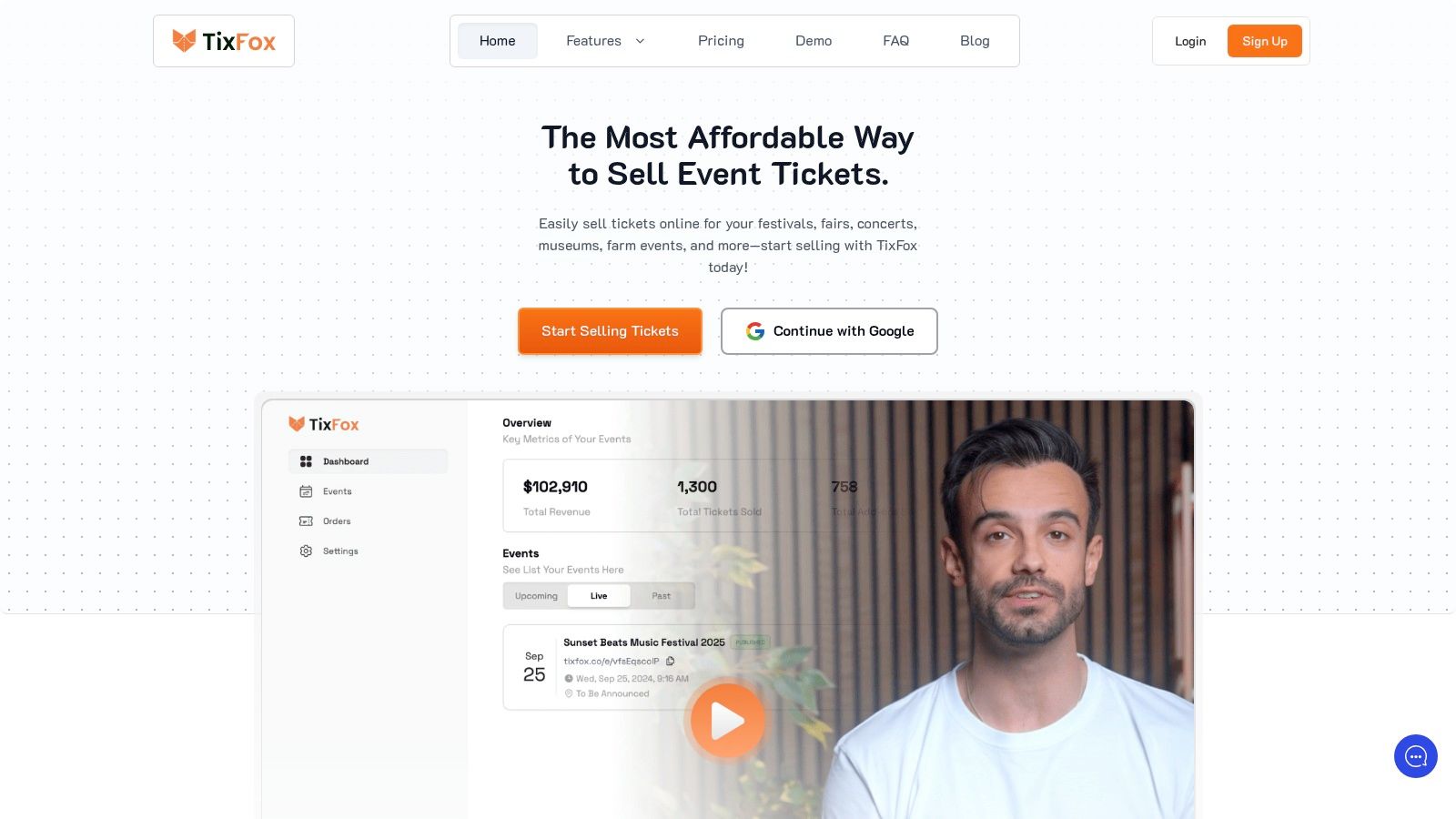
One of the standout features of TixFox is its mobile ticketing capability. Attendees receive their tickets directly on their smartphones, and organizers can leverage the integrated QR code scanning functionality for quick and efficient check-in at the event. This eliminates the need for physical tickets and simplifies entry management, particularly for large-scale events. The dedicated TixFox iOS and Android apps further enhance this mobile experience, providing organizers with real-time event management tools at their fingertips, including on-the-spot ticket sales and attendee tracking.
For event organizers looking to integrate their ticketing with other marketing and automation tools, TixFox offers integrations with popular platforms like Zapier and Mailchimp. This allows for seamless data transfer and automation of tasks such as email marketing campaigns and attendee list management. From a pricing perspective, TixFox offers a transparent and competitive model. They charge a small fee of $0.39 per paid ticket, plus standard Stripe processing fees. Importantly, TixFox offers free ticketing for free events, making it an attractive option for non-profit organizations or community gatherings.
Pros:
User-friendly interface with customizable event page setup.
Flexible ticketing options including VIP, early bird, and private event controls.
Secure and seamless payment processing through Stripe.
Mobile apps for iOS and Android enable efficient QR code ticket scanning and real-time event management.
Transparent and affordable pricing with $0.39 per paid ticket fee and no charges for free events.
24/7 customer support.
Cons:
Stripe fees are additional and not included in the platform fee.
Limited information available on advanced analytics or event marketing features beyond integrations.
Website: https://tixfox.co
Implementation Tips:
Take advantage of the customizable event pages to create a branded experience that reflects your event’s identity.
Explore the various ticket types offered by TixFox to cater to different attendee segments and maximize revenue.
Utilize the mobile apps for efficient check-in and real-time event management.
Integrate with Zapier or Mailchimp to streamline your marketing and automation efforts.
TixFox deserves its place on this list because it offers a compelling blend of user-friendliness, affordability, and essential features for event organizers of all sizes. Its mobile-first approach, coupled with its transparent pricing and dedicated support, makes it a reliable and efficient ticketing software for events ranging from small gatherings to large-scale productions.
2. Eventbrite
Eventbrite is a leading ticketing software for events, offering a comprehensive suite of tools for organizers of all sizes. Whether you're planning a small workshop, a large conference, a music festival, or a local community gathering, Eventbrite can handle the complexities of ticketing, promotion, and event management. Its end-to-end capabilities streamline the process from initial setup to on-site check-in, making it a popular choice for both seasoned professionals and first-time event planners. Eventbrite's user-friendly interface simplifies tasks like creating event pages, managing ticket sales, and tracking attendee data. Its robust marketing features and integration options further enhance its appeal, allowing organizers to reach a wider audience and manage their events effectively.
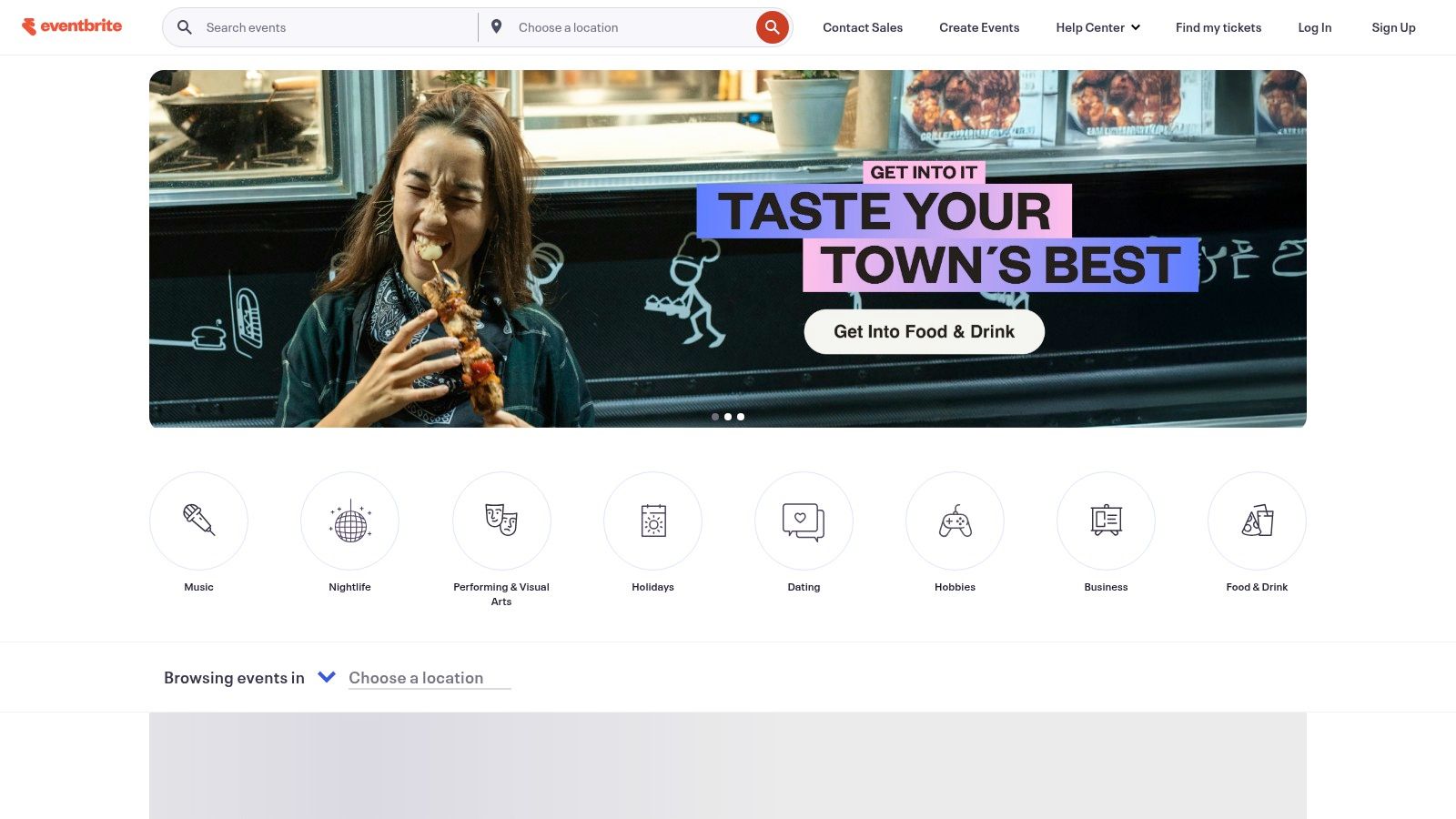
One of Eventbrite's key strengths is its widespread brand recognition. Listing your event on Eventbrite gives you access to its large existing user base, potentially driving organic traffic to your event page. The platform offers various ticket types and pricing tiers, allowing you to cater to different attendee segments. Features like mobile-optimized event pages and a dedicated mobile check-in app contribute to a seamless experience for both organizers and attendees. Real-time sales tracking and analytics provide valuable insights into event performance, enabling data-driven decision-making. Integrated promotional tools and social media sharing capabilities simplify marketing efforts, helping you reach a wider audience and boost ticket sales. Furthermore, Eventbrite offers powerful marketing tools including email campaigns and SEO optimization features, further amplifying your promotional reach.
While Eventbrite's free plan provides basic functionality, more advanced features, like reserved seating and custom branding, require a paid subscription. Pricing is generally based on a percentage of ticket sales plus a per-ticket fee. These fees, while competitive, can be a significant consideration for paid events, especially larger ones. Another potential drawback is that customization options on the free plan are somewhat limited. While Eventbrite boasts a generally intuitive interface, customer support can sometimes be slow during peak periods. Finally, some advanced features, such as advanced reporting and analytics, are locked behind paid plans.
Implementation Tips:
Start early: Setting up your event on Eventbrite well in advance allows ample time for promotion and ticket sales.
Optimize your event page: Use high-quality images, compelling descriptions, and relevant keywords to attract potential attendees.
Leverage social media integration: Connect your Eventbrite account to your social media channels to amplify your marketing efforts.
Utilize the mobile check-in app: Streamline event entry and track attendance efficiently with Eventbrite's mobile app.
Explore integrations: Eventbrite integrates with various third-party tools, such as CRM and marketing automation platforms, expanding its functionality.
Eventbrite's ease of use, comprehensive features, and extensive reach make it a strong contender for event organizers seeking a reliable ticketing software solution. Its place on this list is well-deserved due to its balance of functionality, accessibility, and marketing power. While the associated fees and limited customization on the free plan should be considered, Eventbrite's robust features and brand recognition make it a valuable tool for managing and promoting events effectively.
3. Ticketmaster
Ticketmaster is a behemoth in the world of ticketing software for events, and its inclusion on this list is a no-brainer for organizers of large-scale events. If you're aiming to fill stadiums, arenas, or large theaters, Ticketmaster's extensive reach and robust infrastructure are hard to beat. While it's primarily geared toward large venues and high-profile events, understanding its capabilities is crucial for any event organizer researching ticketing software for events.
Ticketmaster's decades of experience translate into a platform offering comprehensive tools designed for complex events. Its core strength lies in managing high-volume sales, intricate seating arrangements, and venue access control. For example, imagine organizing a concert in a stadium with tiered seating and varying ticket prices. Ticketmaster's interactive seat maps allow attendees to select their exact seats and see the corresponding price, streamlining the purchasing process and improving customer satisfaction. This reserved seating functionality is a key feature for events requiring specific seat assignments.
Beyond ticketing, Ticketmaster provides tools for venue management, allowing organizers to oversee everything from seat allocation to access control. The platform also boasts sophisticated anti-scalping and fraud prevention measures, including their Verified Fan technology, which helps prioritize ticket sales to actual fans rather than bots or scalpers. This is a significant advantage in today's market where ticket resale is a major concern. Their SafeTix™ digital ticketing system utilizes rotating barcodes, adding another layer of security against fraud.
Features:
Reserved seating functionality with interactive seat maps
Anti-scalping and fraud prevention measures (including Verified Fan)
Extensive distribution network
SafeTix™ digital ticketing with rotating barcodes
Advanced venue management capabilities
Pros:
Massive customer reach and brand recognition
Sophisticated anti-fraud technology
Robust backend systems that can handle high-volume sales
Advanced venue management capabilities
Cons:
Higher fees compared to many competitors (pricing structure is generally based on a percentage of ticket sales and can vary depending on the event and venue).
Better suited for large events rather than small gatherings
Less flexibility for independent event organizers (contract negotiations and setup can be more involved).
Complex implementation process (requires dedicated onboarding and training).
Implementation/Setup Tips:
Implementing Ticketmaster typically involves working directly with a dedicated account representative. Be prepared for a more extensive onboarding process than with some smaller platforms. It's crucial to clearly define your event requirements and discuss pricing structures upfront. While the complexity can be daunting, Ticketmaster provides comprehensive support and training resources.
Comparison with Similar Tools:
While competitors like Eventbrite or See Tickets cater to a wider range of event sizes, Ticketmaster stands apart with its robust infrastructure and focus on large-scale events. If you're organizing a smaller, independent event, these alternatives might offer more flexibility and lower fees. However, for major events requiring high-volume sales and advanced security features, Ticketmaster's power and reach are unmatched.
In conclusion, Ticketmaster is a powerful ticketing software for events designed for organizers dealing with large crowds and complex logistics. While its higher fees and complex setup might be a deterrent for smaller events, its robust features, anti-fraud measures, and unparalleled reach make it the industry standard for large-scale ticketing operations. For event planners targeting large audiences and requiring advanced functionalities, Ticketmaster remains a leading contender in the ticketing software landscape.
4. Cvent: Powerhouse Ticketing Software for Complex Events
Cvent stands out as a leading provider of comprehensive event management and ticketing software, perfectly suited for large-scale corporate events, conferences, and meetings. While it offers a full suite of tools covering every aspect of event planning, its ticketing functionalities are particularly robust. This platform shines in managing complex events with numerous tracks, sessions, varying registration types, and intricate attendee requirements. If you're organizing a multi-faceted professional gathering, Cvent's powerful features can streamline your processes and elevate the attendee experience.
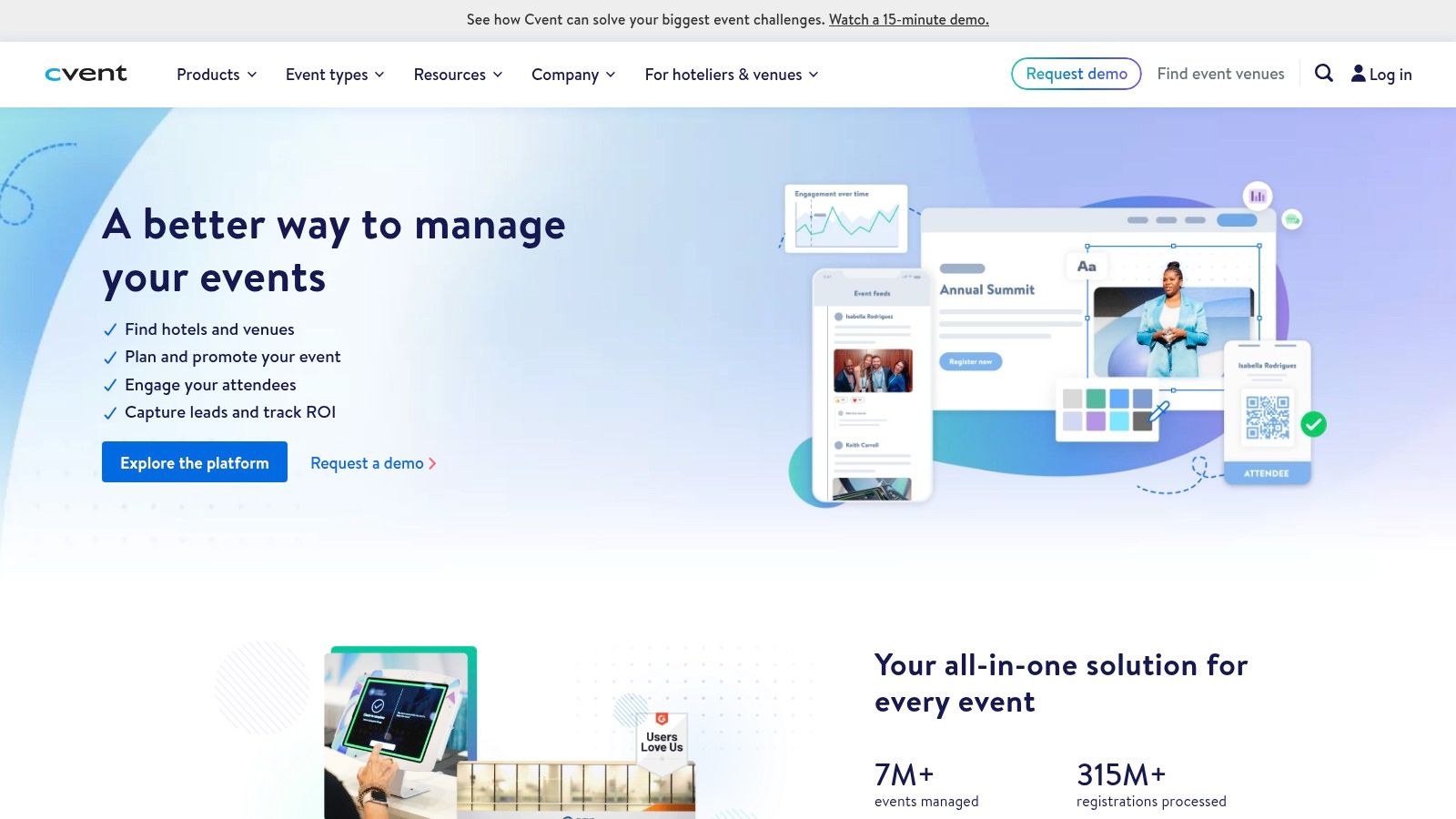
Cvent's strength lies in its ability to handle complexity with grace. Imagine managing a conference with multiple breakout sessions, workshops, and keynote speeches, each requiring separate registration and potentially different pricing tiers. Cvent allows you to create customized registration paths using conditional logic, ensuring attendees only see the relevant options based on their choices. This streamlines the registration process and minimizes confusion. Furthermore, the OnArrival check-in application with badge printing capabilities ensures a smooth and professional on-site experience. Post-event, the platform provides advanced reporting and ROI tracking, offering valuable insights for future events.
This ticketing software for events also integrates seamlessly with major CRM platforms, allowing you to capture valuable attendee data and nurture relationships beyond the event itself. Features like automated email marketing and personalized communication tools enable you to engage attendees before, during, and after the event, fostering a sense of community and maximizing the impact of your gathering.
Features:
End-to-end event management from venue selection to post-event analysis
Customizable registration paths and conditional logic
OnArrival check-in application with badge printing capabilities
Advanced reporting and ROI tracking
Integration with major CRM platforms
Pros:
Comprehensive suite of tools covering every aspect of event management
Highly customizable to meet specific organizational requirements
Robust security and compliance features
Excellent for complex corporate events with multiple sessions and tracks
Cons:
Steeper learning curve compared to simpler platforms
Higher price point making it less accessible for smaller organizations
Can be unnecessarily complex for simple events
Implementation often requires dedicated resources or consultants
While pricing information isn't readily available on their website, Cvent typically operates on a quote-based system, tailoring pricing to the specific needs and scale of each event. This makes it a powerful option for large enterprise clients but potentially less accessible for smaller organizations with limited budgets. Implementation can also require dedicated resources or the assistance of Cvent consultants to maximize the platform's potential.
Cvent earns its place on this list as the go-to solution for complex, large-scale events requiring robust ticketing and event management capabilities. If you're looking for a powerful, customizable platform that can handle the intricacies of a multi-faceted gathering, Cvent is worth exploring. However, if your event is smaller or simpler, a less complex and more budget-friendly alternative might be a better fit. Consider your specific needs and resources carefully when evaluating ticketing software for events.
5. Ticket Tailor
Ticket Tailor presents a compelling option for event organizers seeking ticketing software for events, especially those prioritizing affordability and ease of use. It distinguishes itself from industry giants by offering a refreshingly transparent and straightforward pricing structure, concentrating on empowering independent organizers and small to medium-sized events to maximize their revenue. Whether you're organizing a local workshop, a multi-day conference, or a vibrant music festival, Ticket Tailor aims to provide the necessary tools without the hefty price tag often associated with larger platforms.
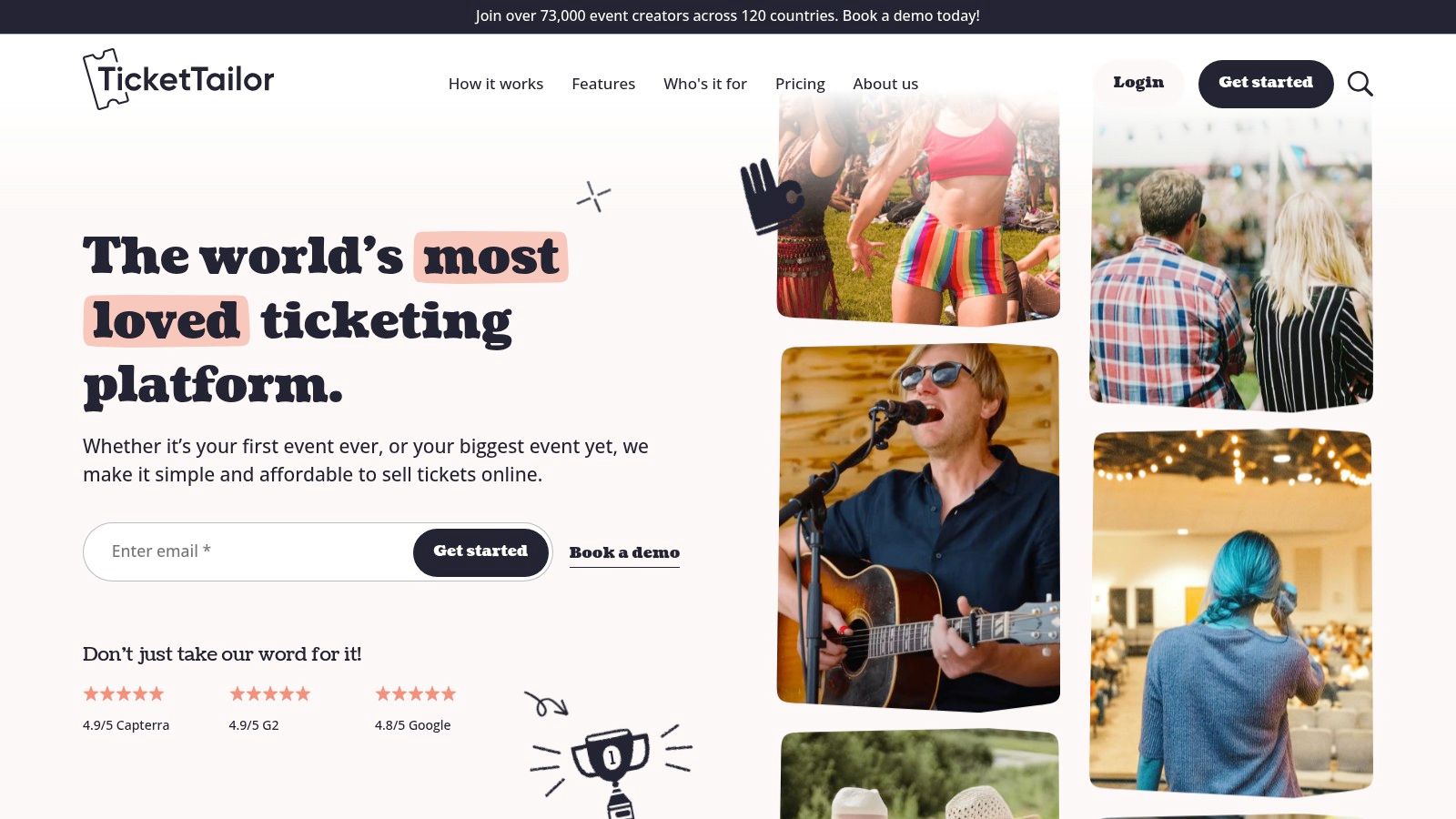
Its core strength lies in its flat-fee pricing model. Unlike many competitors who charge per-ticket fees, Ticket Tailor charges a fixed fee per event, allowing organizers to keep a larger portion of their ticket sales. This predictable pricing structure is particularly beneficial for events with tight budgets. Beyond cost-effectiveness, Ticket Tailor boasts a user-friendly interface designed for quick setup and easy navigation, making it accessible even for those with limited technical expertise. The platform provides essential ticketing features, including customizable booking forms, reserved seating options, and a convenient box office mode for in-person ticket sales. Furthermore, integrations with popular tools like Zapier, Mailchimp, and WordPress streamline marketing and communication efforts.
For example, imagine you're organizing a small community theater production. With Ticket Tailor, you can quickly set up online ticketing, customize your booking form to gather specific attendee information, and manage seating arrangements without wrestling with complicated software. On the day of the performance, the box office mode allows for seamless on-site ticket sales and check-in. Post-event, you can leverage the Mailchimp integration to send thank you notes and updates to your attendees, fostering community engagement.
While Ticket Tailor shines in simplicity and affordability, it's important to be aware of its limitations. Compared to larger platforms like Eventbrite, it offers fewer built-in marketing and event discovery features. While it can handle a wide range of event types, it might lack some advanced features required for exceptionally complex events with intricate ticketing needs. The smaller user base also means less organic discoverability compared to platforms with larger marketplaces. Finally, while a mobile app is available, its functionality is not as comprehensive as some competitors.
Pros:
Significantly lower fees than major ticketing platforms.
Simple and intuitive interface, minimizing setup time.
White-label option for complete branding control.
Responsive customer support.
Cons:
Fewer marketing and discovery features than larger platforms.
Limited advanced features for very complex events.
Smaller marketplace for organic ticket discovery.
Mobile app functionality not as comprehensive as some competitors.
Ticket Tailor deserves its place on this list because it offers a powerful yet affordable solution for event organizers who prioritize simplicity, transparency, and cost-effectiveness. If you’re looking for ticketing software for events without the premium price tag and complex feature set of larger platforms, Ticket Tailor is worth considering.
6. Eventix
Eventix is a European-based ticketing software for events that prioritizes a sleek, modern user experience with a strong focus on customization and brand consistency. This platform offers adaptable solutions for a variety of event types, ranging from large-scale music festivals and concerts to intimate club nights, conferences, and everything in between. Eventix sets itself apart with advanced features like dynamic pricing, allowing you to adjust ticket prices based on demand, and personalized upselling opportunities to maximize revenue. For those needing deep integration with existing systems, Eventix boasts extensive API capabilities. This makes it a powerful tool for event organizers looking for granular control over their ticketing process.
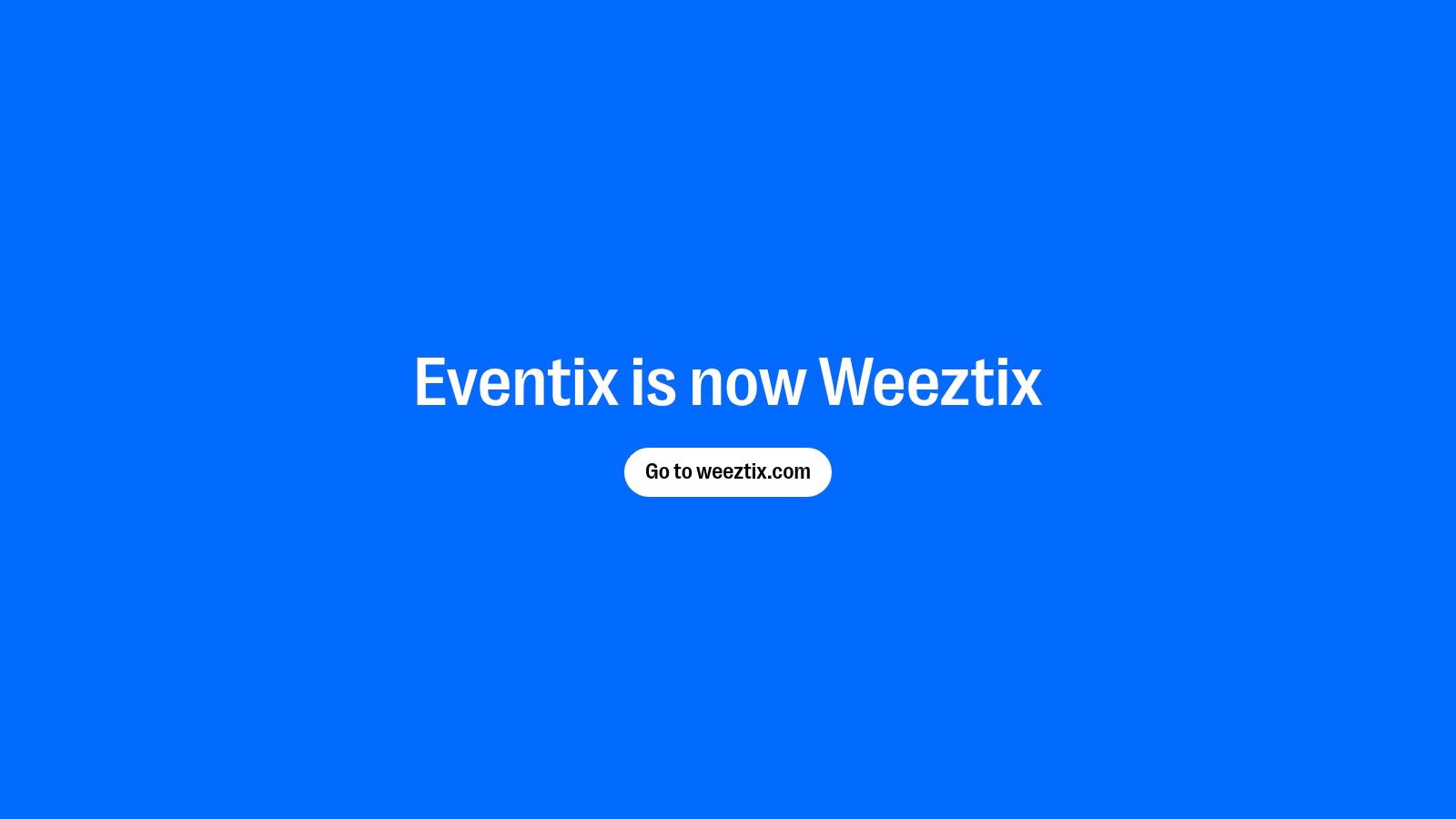
For event organizers seeking a truly white-label solution, Eventix offers extensive branding options, allowing you to seamlessly integrate ticketing into your existing website and marketing materials. This level of customization extends to the ticket purchasing process itself, creating a cohesive brand experience for your attendees. The platform's mobile app facilitates QR code scanning for efficient entry management, minimizing queues and streamlining the check-in process. Multiple payment gateway integrations, including iDEAL and PayPal, cater to a diverse audience and simplify payment processing.
Eventix earns its spot on this list due to its robust feature set combined with a focus on user experience and brand control. While other platforms may offer a wider range of third-party integrations, Eventix excels in providing a deeply customizable and user-friendly core ticketing experience. This is particularly valuable for organizers prioritizing brand consistency and a seamless attendee journey.
Pros:
Highly customizable white-label solution, allowing for a fully branded ticketing experience.
Transparent and competitive pricing structure. While specific pricing isn't publicly available, Eventix emphasizes its competitive rates and encourages users to contact them for a tailored quote.
Strong focus on GDPR compliance and data protection, crucial for events dealing with European attendees.
Excellent customer support with dedicated personal account managers, offering personalized assistance.
Cons:
Less well-known in North America compared to its European presence.
Fewer pre-built third-party integrations compared to some larger competitors. However, the comprehensive API allows for custom integrations.
Limited organic discovery features for promoting events within the Eventix platform. Organizers will likely rely on their own marketing channels.
Some advanced features, particularly API integrations, require technical implementation skills.
Implementation Tips:
If you're looking for a highly branded experience, dedicate time to fully utilize Eventix's customization options.
Leverage the dynamic pricing feature to optimize revenue, particularly for high-demand events.
Explore the API documentation if you require custom integrations with your existing systems. Consider engaging a developer if you lack in-house technical expertise.
Eventix is a strong choice for event organizers, especially those in Europe, who prioritize branding, customization, and a polished attendee experience. Its robust feature set, combined with a commitment to data privacy and customer support, makes it a valuable tool for managing ticketing across various event types.
7. TicketSpice
TicketSpice is a robust ticketing software for events designed to help organizers maximize revenue by minimizing fees and offering flexible payment options. Unlike platforms that redirect customers to third-party checkout pages, TicketSpice prioritizes customization, enabling you to create branded ticketing experiences that seamlessly integrate with your event's aesthetic. This platform is particularly well-suited for nonprofits, churches, and community organizations due to its donation features and affordable pricing structure, making it a compelling choice for those seeking greater control over their ticketing process.
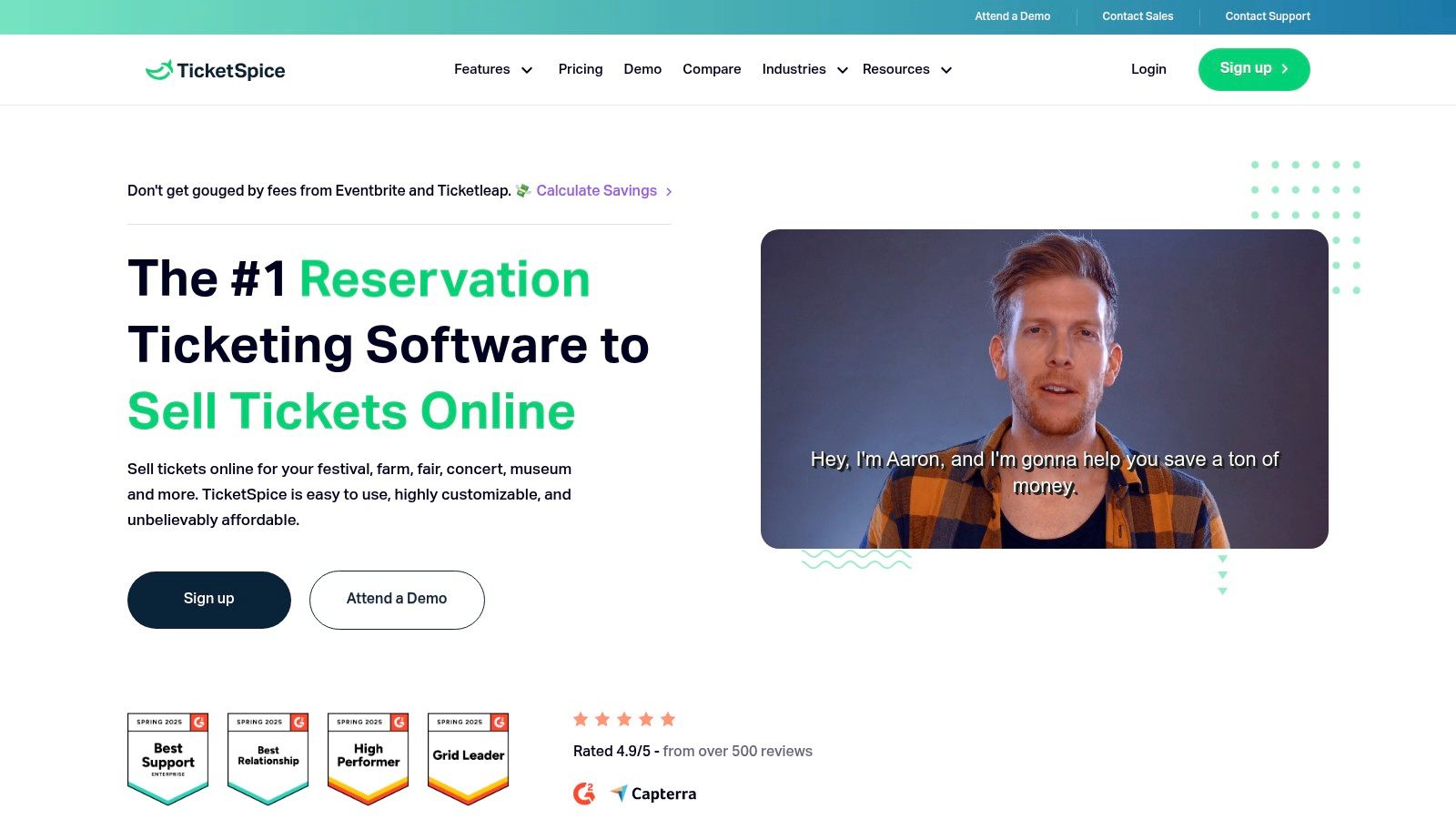
For event organizers seeking a highly customizable and cost-effective solution, TicketSpice offers a compelling alternative to larger ticketing platforms. Its focus on branding and minimizing fees makes it a valuable tool for maximizing event revenue. The ability to integrate donations directly into the checkout process is especially beneficial for non-profit organizations. Let’s explore its key features: you can create a customized checkout process with integrated donation options, configure flexible fee absorption (choose to pass fees on to customers or absorb them yourself), manage reserved seating with interactive seat maps, offer discount codes and early bird pricing, and accept payments through multiple processors like Stripe, PayPal, and Authorize.net.
While TicketSpice offers competitive per-ticket pricing beginning at $0.99 + 2.5%, detailed pricing information for specific feature sets is best obtained by contacting their sales team. This allows for tailoring the pricing to your particular event needs. There are no specific technical requirements mentioned for implementation beyond a stable internet connection to access the platform and manage your events.
Compared to industry giants like Eventbrite or Ticketmaster, TicketSpice shines in its white-labeling capabilities and lower fees. While these larger platforms benefit from broader name recognition and built-in event discovery marketplaces, TicketSpice compensates with greater control over branding and revenue. Event organizers seeking a streamlined, cost-effective solution with excellent customer support will find TicketSpice a strong contender. However, if advanced reporting and analytics or a feature-rich mobile app are critical to your event management, you might find those features more developed in enterprise-level ticketing platforms.
Implementation Tips:
Branding: Take full advantage of TicketSpice's customization options to create a branded ticketing experience that matches your event's website and marketing materials. This reinforces brand consistency and provides a professional impression.
Fee Strategy: Carefully consider your fee absorption strategy. Passing fees onto attendees can make your ticket prices appear higher, while absorbing them can impact your bottom line. Experiment to find the optimal balance for your event.
Donations: For nonprofits, clearly communicate the donation options during the checkout process. Highlighting the impact of contributions can significantly increase donation amounts.
Customer Support: Don't hesitate to leverage TicketSpice's renowned customer support for assistance with setup, customization, or any technical challenges.
Pros:
Lower fees with flexible absorption options
Same-day payouts available
Excellent white-labeling capabilities
Strong customer service and support
Cons:
Less name recognition than major platforms
Limited marketplace for event discovery
Mobile app less feature-rich than some competitors
Reporting features less comprehensive than enterprise solutions
TicketSpice deserves its place on this list because it offers a powerful, flexible, and affordable solution for event organizers who prioritize branding, revenue maximization, and excellent customer service. Its robust feature set, combined with a focus on customization, makes it a valuable tool for a wide range of events, particularly those hosted by nonprofits and community organizations.
8. Eventzilla: Budget-Friendly Ticketing Software for Professional Events
Eventzilla earns its spot on this list by offering a robust and affordable solution for event organizers seeking comprehensive ticketing software for events. It's particularly well-suited for business events, educational institutions, and nonprofits looking for cost-effective registration and ticketing without sacrificing essential features. If you're prioritizing value and a straightforward approach, Eventzilla deserves your consideration.
This platform excels at streamlining event registration and ticketing for a wide range of events, from conferences and workshops to classes and fundraisers. Eventzilla supports both free and paid events, offering various ticket types and flexible pricing options to accommodate diverse needs.
Key Features and Benefits:
Customizable Registration Forms: Go beyond basic information gathering with customizable registration forms featuring conditional logic. This allows you to tailor questions based on previous answers, creating a more personalized and efficient registration experience.
Multiple Ticket Types and Group Registrations: Offer different ticket tiers (e.g., early bird, VIP, student) and simplify registration for groups with dedicated group discounts and registration options. This flexibility caters to varying attendee needs and encourages larger group participation.
Integrated Email Marketing: Keep attendees informed with integrated email marketing tools. Send automated confirmations, reminders, and updates, enhancing communication and engagement before, during, and after the event.
On-site Check-in with QR Code Scanning: Expedite the check-in process with QR code scanning, minimizing queues and ensuring a smooth entry experience for attendees. This modern approach reflects a commitment to efficiency and professionalism.
Waitlist Management and Automatic Notifications: Effectively manage event capacity with automated waitlisting. The system automatically notifies waitlisted individuals when spots become available, optimizing attendance and minimizing manual effort.
Pros:
Competitive Pricing: Eventzilla offers competitive pricing with lower fees compared to some industry leaders, making it an attractive option for budget-conscious organizers.
Comprehensive Feature Set: Provides a rich set of features geared towards business-oriented events, including customizable registration, flexible ticketing options, and integrated email marketing.
Internationalization: Supports multiple currencies and languages, facilitating global event organization and reach.
Strong Customer Support: Eventzilla is known for its responsive and helpful customer support, providing valuable assistance when needed.
Cons:
User Interface: While functional, the user interface may appear less modern compared to some competitors. This might be a minor consideration for those prioritizing functionality over aesthetics.
Limited Marketing Tools: The built-in marketing and promotional tools are somewhat basic. You might need to supplement them with external marketing platforms for more advanced campaigns.
Mobile Experience: While accessible on mobile devices, the experience isn't as seamless as dedicated mobile apps.
Advanced Features: Some advanced features, such as specific reporting or integrations, may require higher-tier subscription plans.
Pricing: Eventzilla offers various pricing plans to cater to different event sizes and needs, starting with a free option for free events. Paid plans offer more advanced features and support larger events. Check their website for the most up-to-date pricing details.
Technical Requirements: Eventzilla is a cloud-based platform, so there are no specific technical requirements beyond a stable internet connection and a web browser.
Implementation Tips:
Plan your registration form carefully: Take advantage of the conditional logic to gather relevant information and personalize the attendee experience.
Utilize the integrated email marketing: Keep attendees engaged with timely updates and reminders.
Test the on-site check-in process: Ensure a smooth and efficient check-in experience by testing the QR code scanning functionality beforehand.
Comparison: While Eventbrite offers a more modern interface and advanced marketing features, Eventzilla provides a compelling alternative for those prioritizing affordability and a robust core feature set.
Eventzilla is a practical and cost-effective ticketing software for events that empowers organizers to manage registrations, ticketing, and communication effectively. Its comprehensive features, combined with competitive pricing, make it a valuable tool for a wide range of event types. If you're seeking a reliable and budget-friendly solution, Eventzilla is definitely worth exploring.
9. Ticketsource
Ticketsource is a UK-based ticketing software for events, offering a robust and affordable solution, particularly for theater productions, music venues, and community events in the UK and Europe. Its strength lies in its comprehensive reserved seating functionality and integrated box office management, making it ideal for organizers who need precise control over ticket allocation and sales. Unlike many other ticketing platforms, Ticketsource operates on a pay-per-ticket model, eliminating monthly subscription fees. This makes it a cost-effective choice, especially for smaller events or organizations with limited budgets.
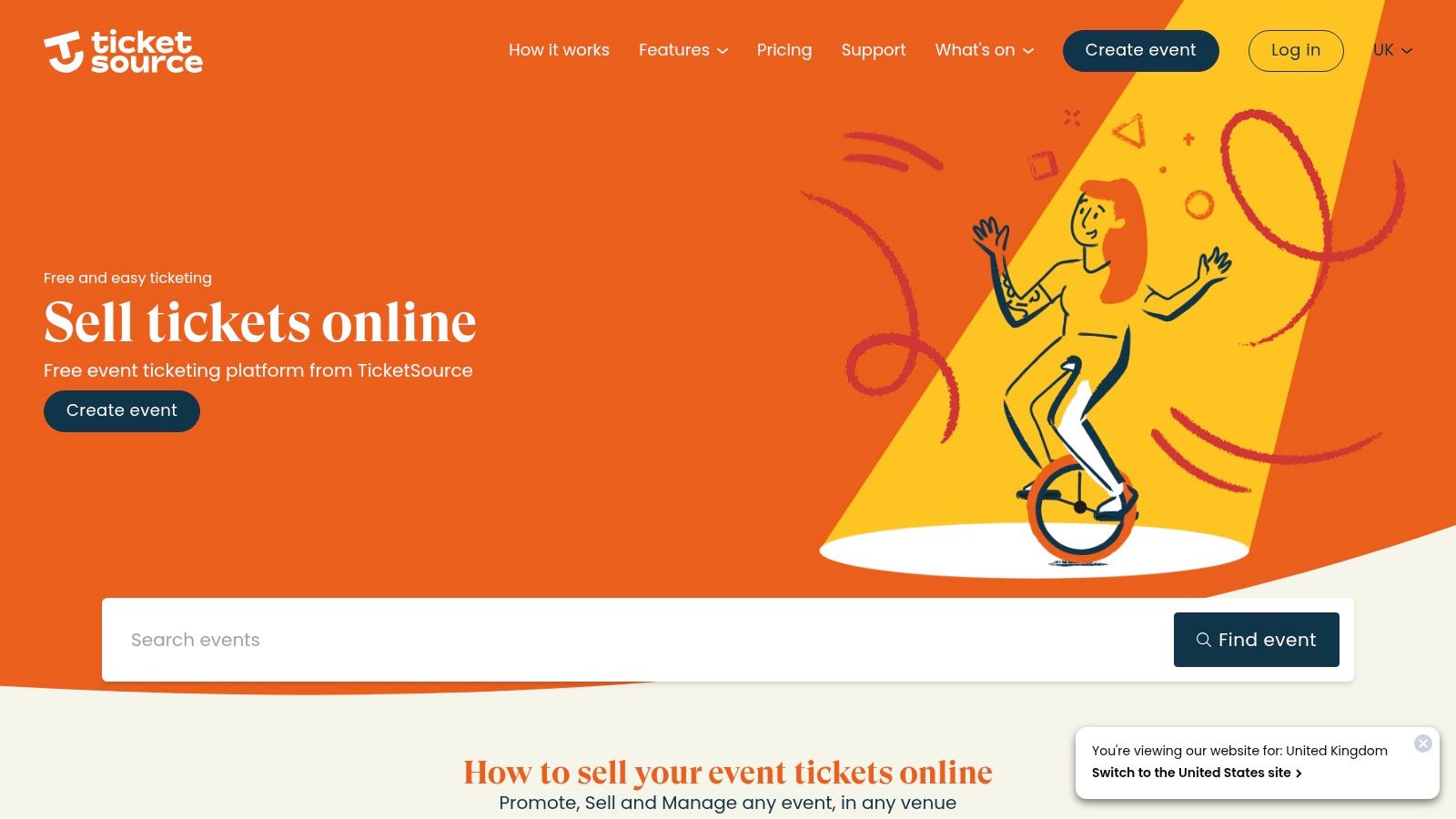
Ticketsource's advanced reserved seating capabilities allow organizers to create detailed venue maps and offer customers a visual representation of available seats. This is particularly beneficial for theatrical performances or concerts where specific seat selection is important. The integrated box office solution further streamlines operations, enabling in-person sales and management alongside online ticket sales. Organizers can print tickets on-site, issue e-tickets, and manage customer data all within a single system. For entry management, barcode scanning functionality ensures a smooth and efficient check-in process. The platform also supports season tickets and membership options, fostering loyalty and simplifying repeat purchases.
While Ticketsource excels in its core functionalities, it does have some limitations. Its marketing and promotional tools are not as extensive as those offered by some competitors, potentially requiring organizers to supplement with other marketing platforms. The mobile app, while functional, could benefit from further development to match the robustness of other ticketing apps. Additionally, the interface may not be as intuitive for first-time users as some other more streamlined platforms. Finally, while expanding, Ticketsource is still less widely known outside of the UK and Europe.
Key Features:
Advanced reserved seating with custom venue mapping
Integrated box office solution for in-person sales
Print-at-home tickets and e-tickets
Barcode scanning for entry management
Season tickets and membership options
Telephone box office support
Pros:
No monthly fees - pay only when you sell tickets
Strong focus on reserved seating functionality
Excellent for theatrical productions and venues
Good telephone box office support options
Cons:
Less well-known outside of UK and Europe
Mobile app functionality not as robust as some competitors
Marketing and promotion tools less comprehensive
Interface not as intuitive for first-time users
Pricing: Pay-per-ticket model. Contact Ticketsource for specific pricing details.
Technical Requirements: Internet access and a standard web browser.
Implementation Tips:
Take advantage of the comprehensive online help resources and telephone support to familiarize yourself with the platform.
Carefully plan your venue map for reserved seating events to maximize accuracy and customer satisfaction.
Consider integrating Ticketsource with your existing marketing tools to expand your promotional reach.
Ticketsource earns its place in this list by providing a specialized and affordable ticketing software for events focused on reserved seating and box office management. If your event is based in the UK or Europe and requires robust reserved seating capabilities without the burden of monthly subscription fees, Ticketsource is a strong contender.
10. Universe
Universe (formerly Ticketfly) is a modern ticketing platform ideal for event organizers seeking a streamlined, mobile-first experience. It focuses on providing a seamless process for both event creators and attendees, emphasizing social integration to broaden event reach. This makes it particularly well-suited for concerts, festivals, and nightlife events looking to leverage the power of social media for promotion and ticket sales. As a subsidiary of Ticketmaster, Universe combines the agility of a smaller platform with the resources and security of an industry giant. This offers a compelling blend of cutting-edge technology and established infrastructure, making it a strong contender in the ticketing software landscape.
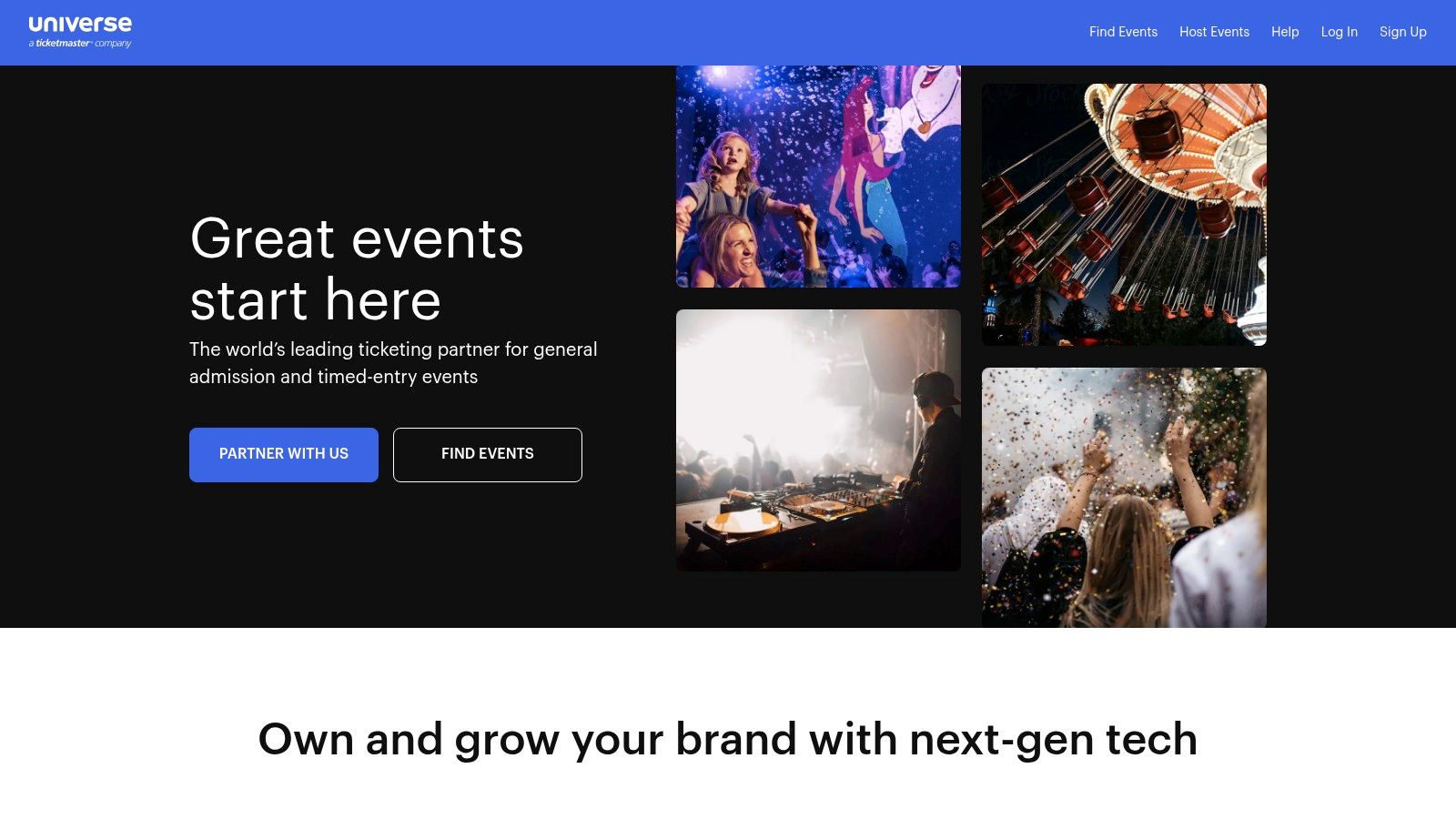
Universe deserves its place on this list due to its focus on a modern, mobile-optimized experience and robust social media integration. For event organizers targeting a younger, tech-savvy audience, these features are crucial. The platform's intuitive interface simplifies the ticketing process, from setting up events and managing ticket sales to providing attendees with a smooth purchase and entry experience.
Key features of Universe include a mobile-first ticketing experience, robust social sharing and discovery features, flexible pricing and fee structures, integrated marketing and promotion tools, and real-time analytics and reporting. The flexible pricing structures allow organizers to customize ticketing options based on their specific event needs, while the integrated marketing tools help amplify promotional efforts and reach a wider audience. Real-time analytics provides valuable insights into ticket sales and attendee demographics, empowering organizers to make data-driven decisions.
While pricing details aren't readily available on the website, Universe operates on a tiered fee structure, which is generally based on a percentage of ticket sales. Like other platforms owned by Ticketmaster, these fees can be higher than those of independent competitors. Technical requirements are minimal, primarily requiring a stable internet connection and a device to access the platform's web-based interface.
Pros:
Modern, sleek interface: Appeals to younger demographics and provides a user-friendly experience.
Strong social integration: Enables viral marketing and expands event reach through platforms like Facebook and Instagram.
Excellent mobile experience: Streamlines both ticket selling and purchasing via mobile devices.
Backed by Ticketmaster's infrastructure: Benefits from established security and reliability.
Cons:
Higher fees: Can be more expensive than some independent ticketing platforms.
Less customization: Offers fewer options for bespoke event management compared to some competitors.
Not as feature-rich: May lack some advanced features found in other platforms designed for complex events.
Customer support: Can experience delays during peak periods.
Implementation Tips:
Leverage the social sharing features to maximize reach and drive ticket sales.
Utilize the real-time analytics to track performance and adjust strategies as needed.
Carefully consider the fee structure and compare it to other platforms before making a decision.
Compared to similar tools like Eventbrite or Brown Paper Tickets, Universe offers a more streamlined and socially focused approach. Eventbrite is a more versatile platform catering to a broader range of event types, while Brown Paper Tickets focuses on affordability and community-based events. Universe carves out a niche for events prioritizing social engagement and a seamless mobile experience, particularly within the music and nightlife sectors.
Ticketing Software Comparison: Top 10 Platforms
Platform | Core Features & Ticketing | User Experience & Quality ★ | Value & Pricing 💰 | Target Audience 👥 | Unique Selling Points ✨ |
|---|---|---|---|---|---|
🏆 TixFox | Multiple ticket types, QR code check-in, private events | User-friendly, mobile apps (iOS/Android) ★★★★☆ | $0.39/ticket + Stripe fees, free events no charge 💰💰 | Event organizers (all sizes) 👥 | Transparent pricing, Stripe payments, 24/7 support, easy integrations ✨ |
Eventbrite | Mobile-optimized pages, promo tools, real-time analytics | Intuitive UI, marketing & SEO tools ★★★★☆ | Higher service fees, some paid plans required 💰💰 | Broad events, conferences, festivals 👥 | Strong brand, extensive marketing tools ✨ |
Ticketmaster | Reserved seating, anti-scalping, fan verification | Enterprise-grade, robust systems ★★★★★ | Higher fees 💰💰💰 | Large venues & events 👥 | Massive reach, advanced anti-fraud tech ✨ |
Cvent | Registration, session tracks, CRM integrations | Highly customizable, complex ★★★★☆ | High price point 💰💰💰 | Corporate events & enterprises 👥 | End-to-end event management, ROI tracking ✨ |
Ticket Tailor | Flat fees (no per-ticket), box office, seating | Simple UI, white-label option ★★★☆☆ | Low fees, upfront pricing 💰 | Small-medium events, independents 👥 | Affordable, full branding control ✨ |
Eventix | White-label, dynamic pricing, API integrations | Modern UI, GDPR focus ★★★★☆ | Transparent & competitive 💰💰 | Festivals, concerts, European market 👥 | Advanced customization, personal account managers ✨ |
TicketSpice | Donation options, flexible fees, seat mapping | Custom branding, good support ★★★☆☆ | Lower fees, flexible fee model 💰💰 | Nonprofits, churches, communities 👥 | Same-day payout, fee absorption options ✨ |
Eventzilla | Conditional logic forms, group registration, QR code | Basic design, international support ★★★☆☆ | Competitive pricing 💰💰 | Business, education, nonprofits 👥 | Affordable, good multi-currency support ✨ |
TicketSource | Reserved seating, box office, barcode scanning | UK/Europe focus, less intuitive UI ★★★☆☆ | No monthly fees, pay per sale 💰 | Theaters, community UK/EU 👥 | No monthly fees, strong reserved seating ✨ |
Universe | Mobile-first, social integrations, real-time reports | Sleek, mobile optimized ★★★★☆ | Higher fees 💰💰💰 | Concerts, nightlife, festivals 👥 | Social sharing, backed by Ticketmaster ✨ |
Making the Best Choice for Your Next Event
Choosing the right ticketing software for events can significantly impact your event's success. From established giants like Ticketmaster and Eventbrite to flexible solutions like Ticket Tailor and Eventzilla, and innovative platforms like Ticketsource and Universe, this list of top 10 tools provides a diverse range of options for every event organizer. Remember, the most suitable platform depends on your specific needs. Consider factors such as event size, budget, required features (like reserved seating, promotional tools, and reporting), and the level of customer support you'll need. Reviewing the key features and pricing models discussed for each ticketing software for events will help you narrow down the choices.
The most important takeaways when selecting your ticketing partner are a user-friendly interface for both you and your attendees, robust features that cater to your specific event format, and dependable customer support to assist you throughout the process. Efficient ticketing software streamlines not only your workload but also the attendee experience, allowing you to focus on creating a truly memorable event.
With the right ticketing software for events in place, you can elevate your event management, boost ticket sales, and ultimately deliver a seamless and engaging experience for your attendees. Ready to experience a powerful, intuitive, and affordable ticketing solution? Explore TixFox – a user-friendly platform designed to simplify event management and enhance attendee experience. Visit TixFox today to learn more and see how it can transform your next event.




